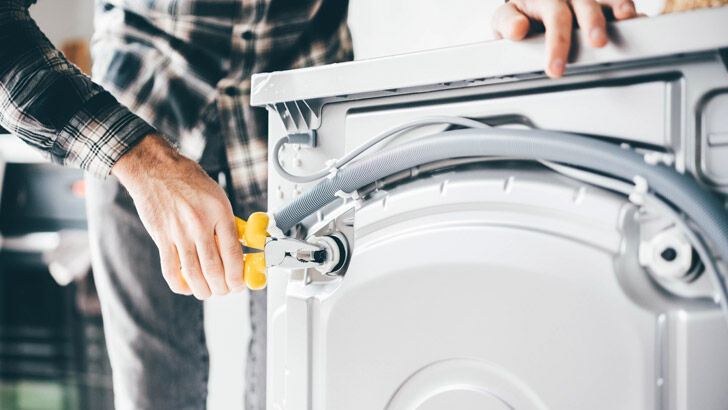Should you repair or replace your broken appliances?
By Tom Watson
There's a particularly unsettling feeling that comes with the realisation that your fridge's soothing hum sounds more like a truck idling, or your cutlery and glasses looked cleaner before they went into the dishwasher than when they came out.
Perhaps it's because our appliances are such an integral part of everyday life that, when they do malfunction or die, it comes with an outsized shock. It's an inconvenience and cost that almost all of us will have to bear at some point.
Given that the price of many new appliances will easily enter the four-figure range, if an appliance stops working, one of the first questions worth asking is whether it can be repaired.
When is it worth repairing an appliance?
Matthew Steen, director of reviews and testing at consumer advocacy group Choice, notes there a few factors you need to weigh up.
"Say you're in your third year of ownership and it's had a major fault - if it's still covered by the manufacturer, then go back and say to them that they should cover you for that particular fault. If it's a minor fault, then you might want to get it repaired, though you could also argue that with the manufacturer.
"But if you don't manage to get that through, then it may be worth looking at the cost of the item per year (based on the purchase price) and how much lifespan it's got left and seeing how that compares to the cost of repairing it versus buying new, because it can cost roughly $200 to get someone out," says Steen.
Tait Leaney, director of Canberra-based Ginger Beard Repair Service, says there are plenty of issues that can be repaired - sometimes by you.
"The most common fault we see, especially with washing machines and dishwashers, are drainage problems. This can be a simple problem that can be repaired by the owner clearing out filters," he says. (There is usually a drain cap in a washing machine, and in a dishwasher the filter sits under the lower spray arm.)
"Make sure you replace the filters properly, though, as nothing should be able to be lifted. If these are fine, then it might be time for a new drain pump, usually for under $100 in parts."
For cooking appliances, Leaney says a faulty oven element is often the source of issues, though he recommends getting a technician out because the fix will involve shutting off power to the appliance at the mains. As for cost, he says new elements are usually under $150.
And for refrigerators, defrosting issues are typically the cause of problems. Leaney says that owners may start to notice this as a build-up of ice at the back of the freezer, or if the freezer is particularly cold but the fridge section is warm. A defective thermostat could be the cause of defrosting issues.

How long should whitegoods last?
Having an awareness of the typical lifespan of appliances could be another useful piece of knowledge when deciding whether to repair or replace an item.
While the idea that price equates to better quality isn't always true, an analysis by Choice found that for many common household appliances, higher-end models outlived their budget counterparts by a considerable margin.
For example, high-end fridges were found to have a life expectancy of around 13 years compared with nine years for mid-range models and six years for entry-level options.
Being able to pay for a more expensive model upfront could prove to be more cost effective in the long run, but Steen stresses that longevity is not a given - it also comes down to how the appliance is used and maintained.
"It really depends on whether you're following your manual, doing regular maintenance and treating them kindly - if you do that then you should expect your appliances to last a good deal of time.
"If you are, say, overloading, regularly moving or putting too much detergent in your washing machine, that could actually decrease the life," says Steen.
Is an extended warranty worth it?
If you are looking to replace an item, then one of the decisions you may be faced with - aside from choosing the brand and model - is whether you should take out an extended warranty.
Customers are under no obligation to take out an extended warranty.
The Australian Competition and Consumer Commission states that retailers need to make that point clear, along with the fact that consumer goods are already covered for major failure or unacceptable quality under consumer law for an initial period after purchase.
This is where the confusion around extended warranties comes in because they often kick in when an item is purchased, rather than when a purchaser's rights under consumer law end.
In short, customers can end up paying for protection they're already guaranteed under law. A 2023 Choice survey further confirms this showing that customers largely made claims against their warranty within two years of buying a product.
How to buy secondhand appliances
If your appliance is beyond repair, you could look for a secondhand replacement.
The value of Australia's secondhand goods market has risen to $62 billion, according to Gumtree's Circular Economy 2022 Report, with the research suggesting that plenty of Australians are looking to purchase secondhand items for both economic and environmental reasons.
But unlike picking up a new jacket from the local op shop, Steen suggests people shopping for secondhand whitegoods or appliances treat the process with the thoroughness of buying a used car.
To start, he recommends people look through product reviews, not only to check whether the brand and product they're looking at is good quality, but whether there have been any major
faults or recalls.
"The other thing you can do is check to see if it's been tested for electrical safety, although you might need a mechanic in that situation," says Steen.
"And does it actually do what you need it to do? With a car you'd check its log to find out whether it's been looked after, so have a look at the product to make sure it's working okay and that it's not making any strange noises.
"And ask if it still has its manual and, obviously, any components it's supposed to come with. You don't want to end up with a stand mixer without a grinder if that's the feature you primarily bought it for - if it doesn't have that, what's the point?"
How to check an appliance's energy rating
When shopping for secondhand electrical goods be sure to check their energy rating. On average, appliances account for 25% of household energy consumption with newer appliances rating as far more efficient than older designs.
Before buying a secondhand appliance, check the energy rating label on the product. Keep in mind that rating scales have been adjusted over time so comparing the star rating on a new appliance with the old label on an existing appliance can be misleading.
The energy consumption number (usually kW or kWh) on the label is the most reliable basis for comparing old and new appliances. You can compare energy ratings at calculator.energyrating.gov.au.
Get stories like this in our newsletters.



